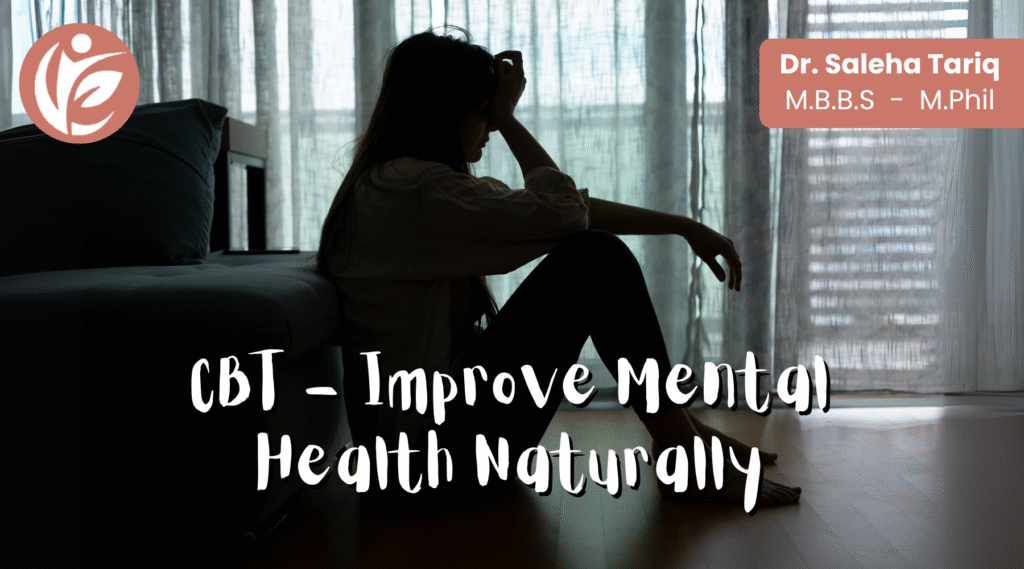CBT - Improve Mental Health Naturally | Dr Saleha Tariq

Here is list of best nutritionist in lahore
- ✍️ Dr. Saleha Tariq
- 🗓 July 28, 2025
Introduction
Mental wellness is an essential part of overall health—just like physical well-being. Whether you’re dealing with anxiety, depression, or stress, understanding the science of emotional and cognitive health can help you heal and grow. In this post, we explore Cognitive Behavioral Therapy (CBT) from a clinical and psychological perspective, focusing on realistic goals, evidence-based methods, and long-term mental wellness.
Importantly, mental health care doesn’t mean avoiding emotions—it means learning to process and manage them with healthy, constructive strategies.
Why CBT Matters
Struggling with mental health can affect every part of life—relationships, work, sleep, and even physical health. Left untreated, these issues may worsen and lead to:
Anxiety disorders
Depression
Post-traumatic stress disorder (PTSD)
Obsessive-compulsive disorder (OCD)
Eating disorders
Substance abuse
Chronic stress and burnout
CBT provides tools to break negative thought patterns, manage distressing emotions, and replace harmful behaviors. It offers a structured, goal-oriented approach that can significantly improve daily functioning and emotional well-being.
The Science of CBT
CBT (Cognitive Behavioral Therapy) is a form of talk therapy grounded in the connection between our thoughts, emotions, and behaviors. It teaches that what we think affects how we feel—and how we act.
CBT focuses on:
Identifying and reframing negative or distorted thoughts
Learning emotional regulation techniques
Developing problem-solving and coping strategies
Building healthier behavioral responses
It’s evidence-based and often used for short-term treatment with long-lasting results. Just like a nutritionist helps you eat better, a CBT-trained therapist helps you think better—and ultimately feel better.
Common and Safe CBT Techniques
Cognitive Restructuring
Learn to identify and challenge irrational or harmful thoughts (“I’m not good enough”, “Nothing ever works out for me”) and replace them with more balanced, realistic ones.
Behavioral Activation
Engage in positive activities that improve mood and reduce withdrawal symptoms, such as hobbies, exercise, or socializing.
Mindfulness and Relaxation
Practice being present in the moment and using breathing exercises, meditation, or grounding techniques to reduce anxiety and stress.
Exposure Therapy
Gradually face and reduce fears in a safe and controlled way—especially effective for phobias, PTSD, and OCD.
Journaling and Tracking
Record thoughts, emotions, and behaviors to notice patterns and progress over time.
When to Seek Professional Help
Consider working with a licensed therapist or mental health professional if:
You’re experiencing persistent anxiety, sadness, or low motivation
Your daily life, work, or relationships are being affected
You have frequent negative or harmful thoughts
You’ve tried self-help but still feel overwhelmed
You want structured, professional support to manage symptoms
CBT can be offered in-person or online and may be used alone or alongside medication, depending on your unique needs.
The Importance of Long-Term Maintenance
Like physical health, mental health requires ongoing attention. Even after therapy, maintaining mental wellness is a continuous process. CBT gives you tools—but it’s your consistent practice that brings lasting change.
Continue using CBT techniques in daily life
Check in with your therapist when needed
Practice mindfulness, self-care, and emotional regulation
Stay connected with your support system
Recognize early warning signs and take proactive steps
Final Thoughts
Mental health is personal—but it’s also medical. With the right support, structured therapy, and a commitment to growth, you can overcome challenges and build a healthier, more fulfilling life.
CBT doesn’t mean ignoring pain—it means understanding it, reframing it, and using it as a stepping stone toward healing.
Always consult a qualified mental health professional before beginning therapy or treatment.
Need CBT Therapy or Mental Health Support in Lahore?
If you’re looking for help with anxiety, depression, stress, or emotional challenges—Cognitive Behavioral Therapy (CBT) might be the solution you need.
Contact us today to book a consultation with CBT specialist Dr. Saleha Tariq, a qualified mental health expert in Lahore. With a compassionate approach and years of experience, she offers personalized, effective therapy to help you regain control and live a healthier, balanced life.
Contact details:
info@smartcareinnovation.com
+92 321 1118617
Related Posts?
Why Weight Loss Matters:
Why Weight Loss Matters
Science behind the Weight Loss:
Science behind the Weight Loss
